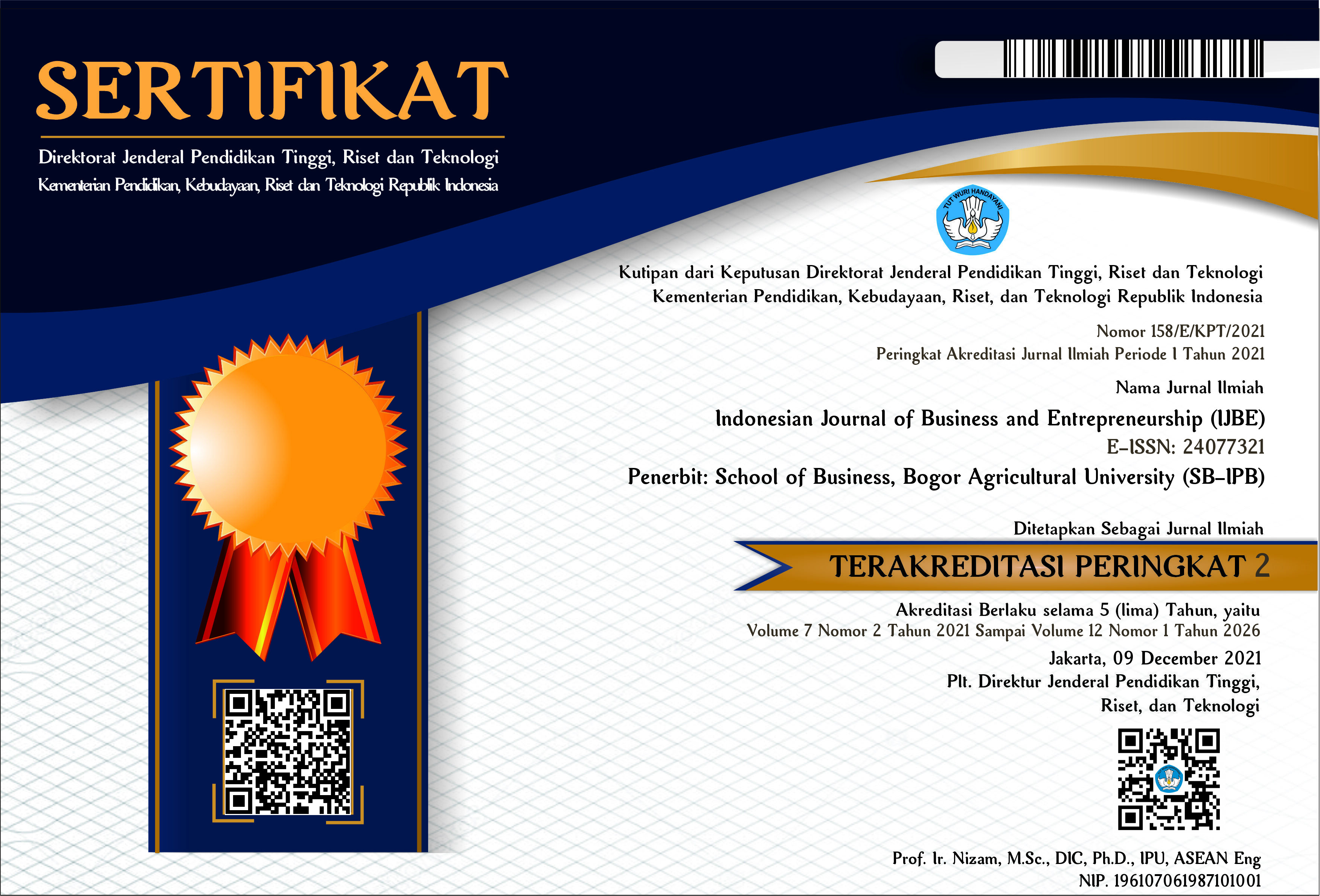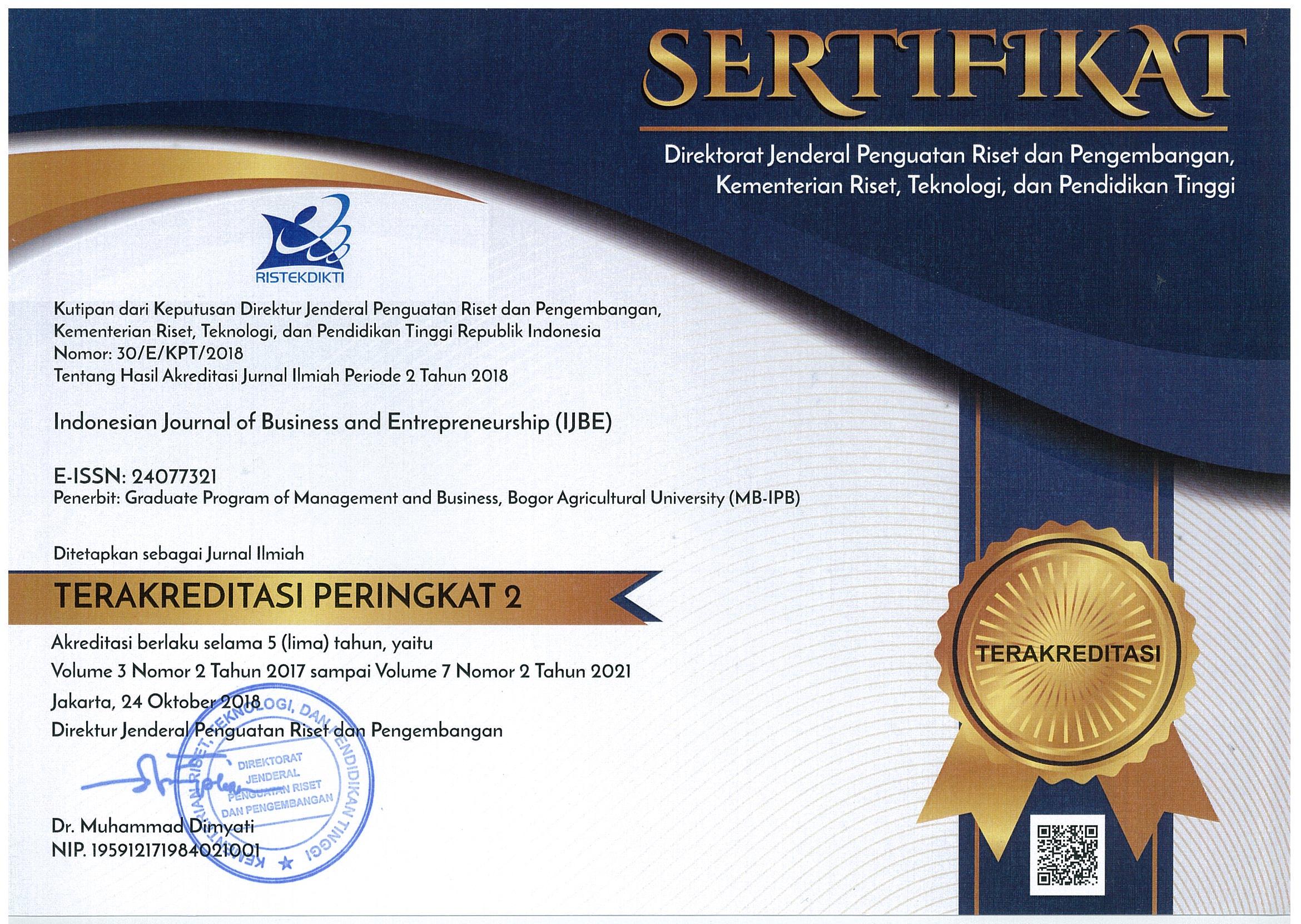The Effect of Paternalistic Leadership on Organisational Ethical Climate: The Role of Organisational Justice As A Moderating Variable
Abstract
This study examines the effect of paternalistic leadership on organisational ethical climate and the role of organisational justice as a moderating variable. The relationship of paternalistic leadership and ethical climate is explained through social learning theory. The respondents used in this study are employees of public organisations as an alternative to the for-profit organisations that previous empirical studies have tended to use. The testing of this model uses the hierarchical regression analysis. The findings of this study confirm the results of earlier studies that paternalistic leadership has a positive and significant impact on organisational ethical climate, particularly in public organisations. The results also show that organisational justice has a moderating role in strengthening the positive influence of paternalistic leadership on organisational ethical climate. The contribution of this study is that, based on contextual factors, effective paternalistic leadership influences the ethical climate in public organisations.
Keywords: organisational ethical climate, organisational justice, paternalistic leadership, public organisations
Downloads
References
REFERENCES
Aronson, E. (2001). Integrating leadership styles and ethical perspectives. Canadian Journal of Administrative Sciences, 18, 244–256.
Aycan, Z. and Gelfand M. J. (2012). Cross-Cultural Organisational Psychology. The Oxford Handbook of Organisational Psychology, 2.
Aycan, Z., Kanungo, R. N., and Sinha, J. B. P. (2000). Impact of culture on human resource management practices: a 10-country comparison. Applied psychology: an international review, 49 (1), 192-221.
Babin, B. J., Boles, J. S., and Robin, D. P. (2000). Representing the perceived ethical work climate among marketing employees. Journal of the Academy of Marketing Science, 28(3), 345–358.
Bandura, Albert. (1971). Social Learning Theory. Library of congress catalog.
Barnett, T. and Vaicys, C. (2000). The moderating effect of individuals’ perceptions of ethical work climate on ethical judgments and behavioural intensions. Journal of Business Ethics, 27, 351–362.
Baron, R. M., and Kenny, D. A. (1986). The moderator-mediator variable distinction in social psychological research: conceptual, strategic, and statistical considerations. Journal of Personality and Social Psychology, 51, 1173-1182.
Bennett, R. J. and Robinson, S. L. (2000). Development of a Measure of Workplace Deviance. Journal of Applied Psychology, 85 (3), 349-360.
Brown, M. E., Trevino, L. K., and Harrison, D. A. (2005). Ethical leadership: A social learning perspective for construct development and testing. Organisational Behaviour and Human Decision Processes, 97, 117–134.
Cheng, B., Huang M., Farh J. (2004). Paternalistic leadership and subordinate responses: Establishing a leadership model in Chinese organisations. Asian Journal of Social Psychology 7, 89–117.
Cheng, Meng Yu and Wang, Lei. (2015). The Mediating Effect of Ethical Climate on the Relationship Between Paternalistic Leadership and Team Identification: A Team-Level Analysis in the Chinese Context. Journal Business Ethics, 129, 639–654.
Cheng, Meng Yu., Wang, Lei., and Lesmana, S. D. (2013). The Relationship Between Patrenalistic Leadership and Organisational Citizenship Behaviour-The Mediating Effect of Ethical Climate International. Journal of Research in Commerce & Management, 4 (10).
Colquitt, Jason A. (2001). On the dimensionality of organisational justice: A construct validation of a measure. Journal of Applied Psychology, 86 (3), 386-400.
Colquitt, Jason A., Colon, Donald A., Ng, K., Wesson, M. J., and Porter, O. L. H. (2001). Justice at the millennium: A meta-analytic review of 25 years of organisational justice research. Journal of applied psychology, 86 (3), 425-445.
Cropanzano, R. and Mitchell, Marie S. (2005). Social Exchange Theory: An Interdisciplinary Review Journal of Management; 31 (874).
Cropanzano, R., Bowen, David E., and Gilliland, Stephen W. (2007). The Management of Organisational Justice. Academy Of Management Executive.
Cullen, J. B., Parboteeah K. P., and Victor, Bart. (2003). The Effects of Ethical Climates on Organisational Commitment: A Two-Study Analysis. Journal of Business Ethics, 46 (2).
Dawson, J. F. 2014. Interpreting Interaction Effects. (Online). Diakses 15 Desember 2015, dari http://www.jeremydawson.co.uk/slopes.htm
Deconinck, J., Johnson, J., and Busbin, J. (2012). The Effect of Organisational Justice on Salespersons’ Perceived Ethical Climate, Organisational Commitment and Turnover Intentions. GSTF Journal on Business Review, 2 (2).
Dick, G. P. M. and Rayner, C. (2013). Negative interpersonal behaviour at work: An evidenve based classification of workplace bullying. International Journal of Psychology and Behavioural Sciences, 3 (4), 95-108.
Dickson, Marcus W., Smith, B. D., Grojean, M. W., and Ehrhart, Mark. (2001). An organisational climate regarding ethics: the outcome of leader values and the practices that reflect them. The leadership quarterly, 12, 197-217.
Erben, G. S. and Guneser, A. B. (2008). The Relationship Between Paternalistic Leadership and Organisational Commitment: Investigating the Role of Climate Regarding Ethics. Journal of Business Ethics, 82, 955–968.
Fein, E. C., Tziner, A., Lusky, L., and Palachy, O. (2013). Relationships between ethical climate, justice perceptions, and LMX. Leadership & Organisation Development Journal, 34 (2), 147-163.
Folger, R. and Konovsky, Mary A. (1989). Effect of procedural and distributive justice on reactions to pay raise decision. The academy of management journal, 32 (1), 115 – 130.
Fritzsche, David J. (2000). Ethical Climates and the Ethical Dimension of Decision Making. Journal of Business Ethics, 24, 125–140.
Gert, B. and Culver, C. M. (1976). Paternalistic Behaviour. Philosophy & Public Affairs, 6 (1), 45-57.
Gouldner, A. W. (1960). The norm of reciprocity: A preliminary statement. American sociological review, 25 (2), 161-178.
Greenberg, Jerald. (1987). A taxonomy of organisational justice theories. The academy of management review. 12 (1), 9 -22.
Greenberg, Jerald. (1990). Employee Theft as a Reaction to Underpayment Inequity: The Hidden Cost of Pay Cuts. Journal of Applied Psychology, 75 (5), 561-568.
Grojean, M. W., Resick, C. J., Dickson, M. W., & Smith, D. B. (2004). Leaders, values, and organisational climate: Examining leadership strategies for establishing an organisational climate regarding ethics. Journal of Business Ethics, 55, 223–241.
Hair et al. (2010). Multivariate Data Analysis. 7th edition. New Jersey: Pearson Education.
Hambrick, D. C., and Mason, P. (1984). Upper echelons: The organisation as a reflection of its top managers. Academy of Management Review, 9, 193–206.
Henle, C. A. (2005). Predicting workplace deviance from the interaction between organisational justice and personality. Journal of managerial issues, 17 (2), 247-263.
Lau, V. C. S., Au, W. T., and Ho, J. M. C. (2003). A qualitative and quantitative review of antecedents of counterproductive behaviour in organisations. Journal of Business and Psychology, 18 (1), 73-99.
Lewis, D. and Gunn, R. (2007). Workplace bullying in the public sector: Understanding the racial dimension. Public Administration. 85 (3), 641-665.
Martin, Kelly D. and Cullen, John B. (2006). Continuities and Extensions of Ethical Climate Theory: A Meta-Analytic Review. Journal of Business Ethics.
Masterson, S. S., Lewis, K., Goldman, B. M., and Taylor, M.S. (2000). Integrating justice and social exchange: the differing effects of fair procedures and treatment on work relationships. Academy of management journal, 43 (4), 738-748.
Mikula, G., Petrik, B., and Tanzer, N. 1990. What people regard as unjust: Types and structures of everyday experiences of injustice. European Journal of Social Psychology, 20, 133-149.
Moorman, Robert H. (1991). Relationship Between Organisational Justice and Organisational Citizenship Behaviours: Do Fairness Perceptions Influence Employee Citizenship? Journal of Applied Psychology, 76 (6), 845-855.
Mulki, Jay P., Fernando Jaramillo, and William B. Locander. (2006), “Effects of Ethical Climate and Supervisory Trust on Salesperson’s Job Attitudes and Intentions to Quit,” Journal of Personal Selling & Sales Management, 26, 1 (Winter), 19–26.
Neubert, M. J., Carlson, D. S., Kacmar, K. M., Roberts, J. A., and Chonko, L. B. (2009). The virtuous influence of ethical leadership behaviour: Evidence from the field. Journal of Business Ethics, 90, 157–170.
Nielsen. R. P. (1989). Changing unethical organisational behaviour. Academy of Management Executive, 3, 123.
Otken, A. B. and Cenkci, Tuna. (2012). The Impact of Paternalistic Leadership on Ethical Climate: The Moderating Role of Trust in Leader. Journal of Business Ethics, 108, 525—536.
Pellegrini, E. K. and Scandura, T. A. (2008). Paternalistic leadership: A review and agenda for future research. Journal of Management, 34(3), 566-593.
Peng, Ann C., Schaubroeck, John M., and Li, Y. (2014). Social Exchange Impications of Own and Coworkers’ Experiences of Supervisory Abuse. Academy of Management Journal, 57 (5), 1385–1405.
Robinson, S. L., Kraatz, M. S., and Rousseau, D. M. (1994). Changing obligations and the psychological contract: A longitudinal study. Academy of Management Journal, 37 (1), 137-152.
Robinson, S. L., Morrison, E. W. (1995). Psychological Contracts and OCB: The Effect of Unfulfilled Obligations on Civic Virtue Behaviour. Journal of Organisational Behaviour, 16, 289−298.
Rohrmann, C. A. and Rego, C. (2014). Private Law and State Paternalism: Too Much Legal Regulation of Private Life? Journal of International Commercial Law and Technology. 9 (4).
Schminke, M., Ambrose, M. L., and Neubaum, D. O. (2005). The effect of leader moral development on ethical climate and employee attitudes. Organisational Behaviour and Human Decision Processes, 97, 135–151.
Schwepker, C. H. and Good, D. J. (2009). Ethical Climate’s Influence on Sales Management Practices. Journal of Selling & Major Account Management, 9 (1).
Shore, L. M. and Barksdale, K. (1998). Examining degree of balance and level of obligation in the employment relationship: A social exchange approach. Journal of organisational behaviour, 19 (731).
Thomas, T., Schermerhorn, John R., & Dienhart, John W. (2004). Strategic leadership of ethical behaviour in business. Academy of Management Executive, 18 (2)
Trevino, L. K. (1986). Ethical decision making in organisations: a person x situasion interactionist model. Academy of Management Review, 11, 601-617.
Tsai, Ming-Tien and Huang, Chun-Chen. (2008). The Relationship among Ethical Climate Types, Facets of Job Satisfaction, and the Three Components of Organisational Commitment: A Study of Nurses in Taiwan. Journal of Business Ethics, 80 (3), 565-581.
Tziner, A., Felea, M., and Vasiliu, C. (2015). Relating ethical climate, organisational justice perceptions, and leader-member exchange (LMX) in Romanian organisations. Journal of Work and Organisational Psychology, 31, 51-57.
Van Aswegen, A. S. and Engelbrecht, A. S. (2009). The relationship between transformational leadership, integrity and an ethical climate in organisations. South African Journal of Human Resource Management, 7 (1).
Vardi, Y., and Wiener, Y. 1996. Misbehaviour in organisation: A motivational framework. Organisation Science, 7(2), 151-165.
Victor, B., and Cullen, J. B. (1988). The organisational bases of ethical work climates. Administrative Science Quarterly, 33(1), 101–125.
Wu, Yu Chi and Tsai, Ping Ju. (2012). Multi Dimensional Relationships Between Paternalistic Leadership and Perceptions of Organisational Ethical Climates. Psychological Reports: Human Resources & Marketing, 111 (2), 509-527.
Wyld, David C. and Jones, Coy A. (1997). The Importance of Context: The Ethical Work Climate Construct and Models of Ethical Decision Making: An Agenda for Research. Journal of Business Ethics, 16 (4), 465-47







